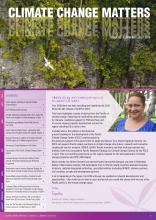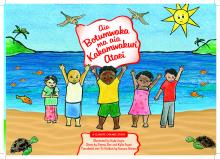Developing climate change information for the Pacific : guidance material to raise awareness and facilitate sectoral decision-making using science-based climate change information and services

Climate Change Resilience
Available Online
Small island developing states (SIDS) are among the most vulnerable to our changing climate. People living in the western tropical Pacific SIDS are already experiencing higher temperatures, shifts in rainfall patterns, rising sea levels and changes in the frequency and intensity of extreme climate events. Further changes on top of an existing, naturally variable climate are expected long into the future because of global warming. These changes in the climate have far-reaching consequences that will affect communities and the built and natural environment. At a national level, sectors that will be impacted include health, infrastructure, water, energy, tourism, food (fisheries, agriculture), natural resources (forestry, biodiversity) and disaster risk management. To deal with these changes, Pacific SIDS need credible, useful and accessible scientific information to inform decision-making at a sectoral level about what drives the climate in the Pacific, how it may change in the future and what the impact of these changes might be.





